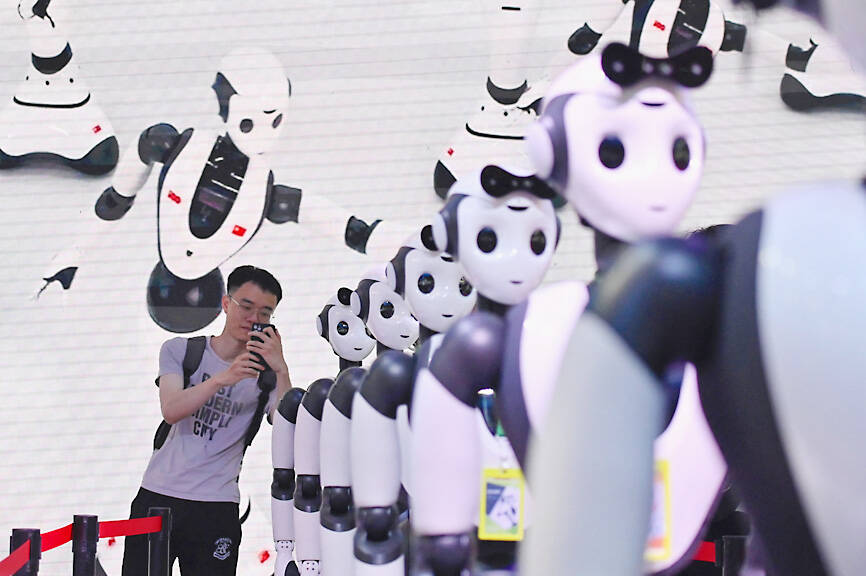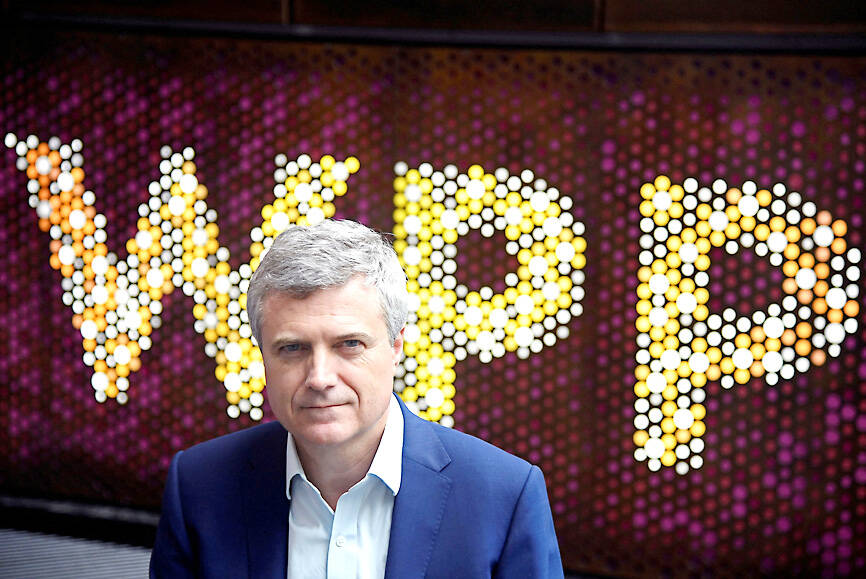Some of the world’s biggest advertisers, from food giant Nestle SA to consumer goods multinational Unilever Corp, are experimenting with using generative artificial intelligence (AI) software such as ChatGPT and DALL-E to cut costs and increase productivity, executives say.
However, many companies remain wary of security and copyright risks as well as the dangers of unintended biases baked into the raw information feeding the software, meaning humans would remain part of the process for the foreseeable future.
Generative AI, which can be used to produce content based on past data, has become a buzzword over the past year, capturing the public’s imagination and sparking interest across many industries.

Photo: AFP
Marketing teams hope it will result in cheaper, faster and virtually limitless ways to advertise products.
Investment is already ramping up amid expectations AI could forever alter the way advertisers bring products to market, executives at two top consumer goods companies and the world’s biggest ad agency said.
The technology can be used to create seemingly original text, images and even computer code, based on training, instead of simply categorizing or identifying data like other AI.

Photo: Reuters
WPP PLC, the world’s biggest advertising agency, is working with consumer goods companies including Nestle and Oreo-maker Mondelez International Inc to use generative AI in advertising campaigns, CEO Mark Read said.
“The savings can be 10 or 20 times,” Read said in an interview. “Rather than flying a film crew down to Africa to shoot a commercial, we’ve created that virtually.”
In India, WPP worked with Mondelez on an AI-driven Cadbury campaign with Bollywood superstar Shah Rukh Khan, producing ads that “featured” the actor asking passers-by to shop at 2,000 local stores during Diwali.
Small businesses used a microsite to generate versions of the ads featuring their own store that could be posted on social media and other platforms.
About 130,000 ads were created featuring 2,000 stores, which gained 94 million views across YouTube and Facebook, WPP said.
The ad agency has “20 young people in their early twenties who are AI apprentices” in London, Read said, adding that it has partnered with the University of Oxford on courses focused on the future of marketing.
The “AI for business” diploma offers training in data and AI for client leaders, practitioners and WPP executives, the company’s Web site shows.
The team work under AI expert Daniel Hulme who was appointed chief AI officer at WPP two years ago.
“It’s much easier to think about all the jobs that will be disrupted than all the jobs that will be created,” Read said.
Nestle is also working on ways to use ChatGPT 4.0 and Dall-E 2 to help market its products, Aude Gandon, WPP’s global chief marketing officer and an ex-Google executive, said in an e-mail.
“The engine is answering campaign briefs with great ideas and inspiration that are fully on brand and on strategy,” Gandon said. “The ideas are then further developed by the creative team to ultimately become content that will be produced, for example for our Web sites.”
While lawmakers and philosophers alike still debate whether content produced by generative AI models amounts to anything like human creativity, advertisers have already begun using the technology in their promotional campaigns.
In one instance, Dutch gallery the Rijksmuseum’s research team went viral online on Sept. 8 last year after using X-ray to reveal objects hidden in Baroque artist Johannes Vermeer’s oil painting The Milkmaid.
Less than 24 hours later, WPP used OpenAI’s generator system DALL-E 2 to “reveal” its own imagined scenes beyond the borders of the painting’s frame in a public YouTube ad for Nestle’s La Laitiere — or milkmaid — yogurt and dairy brand.
Through almost 1,000 iterations, the video of Nestle’s version of The Milkmaid generated 700,000 euros (US$760,869) of “media value” for the Swiss food giant. Media value is the cost of advertising needed to generate the same public exposure.
WPP said the content cost it nothing to make. A spokesperson for the Rijksmuseum said it had an open data policy for non-copyrighted images, meaning anyone can use its images.
Nestle is not alone in its experiments. Unilever, which owns more than 400 brands including Dove soap and Ben & Jerry’s ice cream, has its own generative AI technology that can write product descriptions for retailers’ Web sites and digital commerce sites, it said.
The company’s TRESemme haircare brand has used its AI content generator for written content and its automation tool for visual content on Amazon.co.uk.
However, Unilever is concerned about copyrights, intellectual property, privacy and data, global vice president of go to market technology Aaron Rajan said.
The company wants to prevent its technology from reproducing human biases, such as racial or gender stereotypes, that might be embedded in the data it processes.
“Ensuring that these models when you type in certain terms are coming back with an unstereotyped view of the world is really critical,” he said.
Gandon said that Nestle was “keeping security and privacy top-of-mind.”
Consumer companies are using data from retailers such as Walmart Inc, Carrefour and Kroger to power their AI tools, said Martin Sorrell, executive chair of advertising group S4 Capital and founder of WPP.
“You’ve got two buckets of clients: one that is jumping in fully and the other that is saying ‘let’s experiment,’” he said.
Some consumer goods firms remain wary of security risks or copyright breaches, industry executives say.
“If you want a rule of thumb: Consider everything you tell an AI service as if it were a really juicy piece of gossip. Would you want it getting out?” said Ben King, vice president of customer trust at Okta Inc, a provider of online authentication services.
“Would you want someone else knowing the same sort of thing about you?” he added. “If not, don’t tell the AI.”

MULTIFACETED: A task force has analyzed possible scenarios and created responses to assist domestic industries in dealing with US tariffs, the economics minister said The Executive Yuan is tomorrow to announce countermeasures to US President Donald Trump’s planned reciprocal tariffs, although the details of the plan would not be made public until Monday next week, Minister of Economic Affairs J.W. Kuo (郭智輝) said yesterday. The Cabinet established an economic and trade task force in November last year to deal with US trade and tariff related issues, Kuo told reporters outside the legislature in Taipei. The task force has been analyzing and evaluating all kinds of scenarios to identify suitable responses and determine how best to assist domestic industries in managing the effects of Trump’s tariffs, he

TIGHT-LIPPED: UMC said it had no merger plans at the moment, after Nikkei Asia reported that the firm and GlobalFoundries were considering restarting merger talks United Microelectronics Corp (UMC, 聯電), the world’s No. 4 contract chipmaker, yesterday launched a new US$5 billion 12-inch chip factory in Singapore as part of its latest effort to diversify its manufacturing footprint amid growing geopolitical risks. The new factory, adjacent to UMC’s existing Singapore fab in the Pasir Res Wafer Fab Park, is scheduled to enter volume production next year, utilizing mature 22-nanometer and 28-nanometer process technologies, UMC said in a statement. The company plans to invest US$5 billion during the first phase of the new fab, which would have an installed capacity of 30,000 12-inch wafers per month, it said. The

Taiwan’s official purchasing managers’ index (PMI) last month rose 0.2 percentage points to 54.2, in a second consecutive month of expansion, thanks to front-loading demand intended to avoid potential US tariff hikes, the Chung-Hua Institution for Economic Research (CIER, 中華經濟研究院) said yesterday. While short-term demand appeared robust, uncertainties rose due to US President Donald Trump’s unpredictable trade policy, CIER president Lien Hsien-ming (連賢明) told a news conference in Taipei. Taiwan’s economy this year would be characterized by high-level fluctuations and the volatility would be wilder than most expect, Lien said Demand for electronics, particularly semiconductors, continues to benefit from US technology giants’ effort

‘SWASTICAR’: Tesla CEO Elon Musk’s close association with Donald Trump has prompted opponents to brand him a ‘Nazi’ and resulted in a dramatic drop in sales Demonstrators descended on Tesla Inc dealerships across the US, and in Europe and Canada on Saturday to protest company chief Elon Musk, who has amassed extraordinary power as a top adviser to US President Donald Trump. Waving signs with messages such as “Musk is stealing our money” and “Reclaim our country,” the protests largely took place peacefully following fiery episodes of vandalism on Tesla vehicles, dealerships and other facilities in recent weeks that US officials have denounced as terrorism. Hundreds rallied on Saturday outside the Tesla dealership in Manhattan. Some blasted Musk, the world’s richest man, while others demanded the shuttering of his